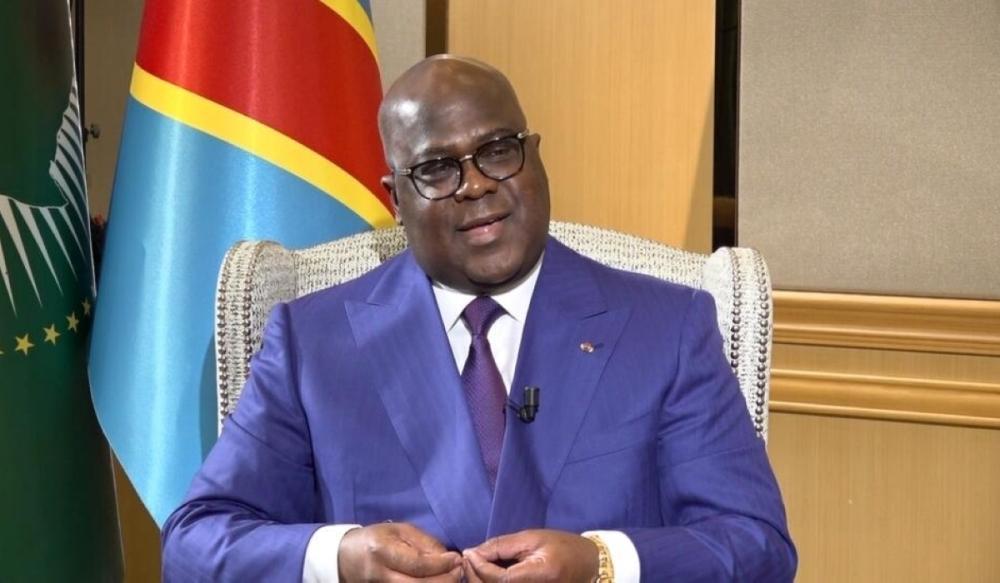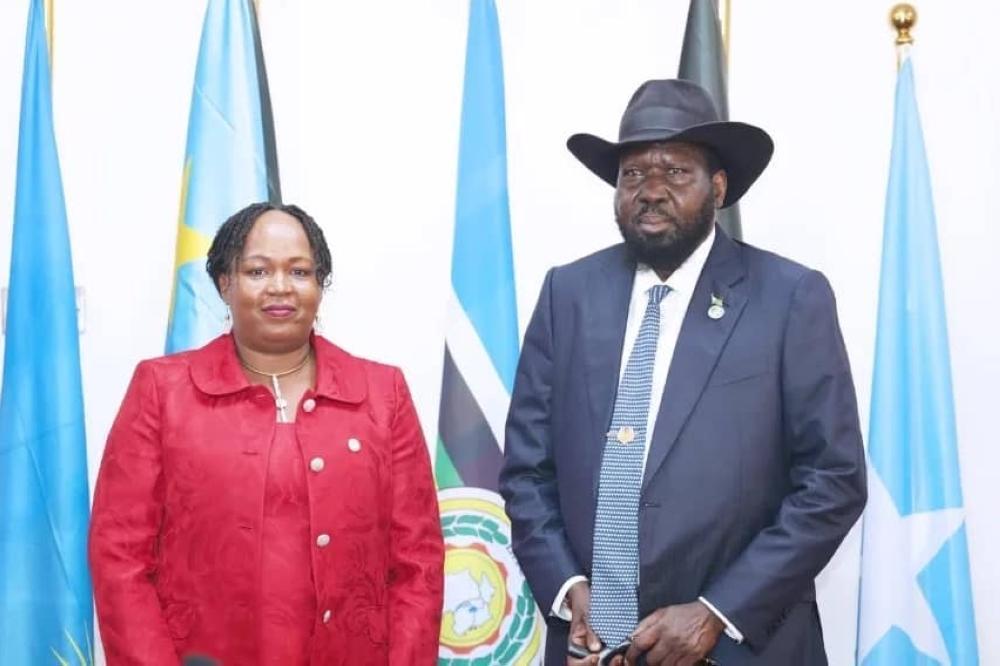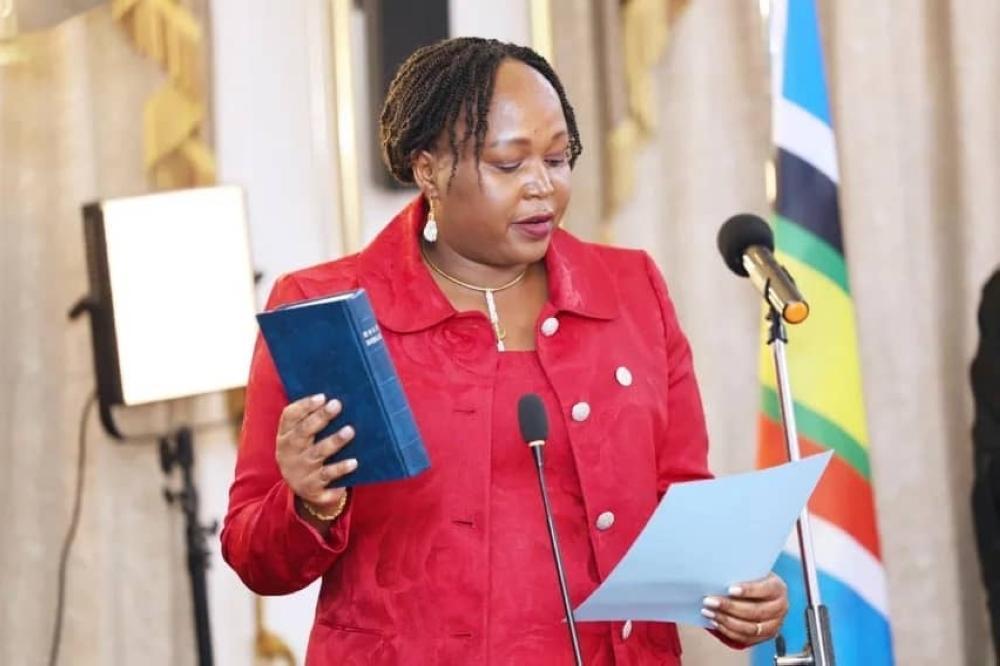Africa-Press – Rwanda. While the Presidents of Rwanda, South Sudan, Uganda and Tanzania attended in person and Burundi and Kenya were represented by high-level delegates, Congolese president Félix Tshisekedi boycotted an extraordinary East African Community (EAC) Heads of State Summit held virtually on Friday, June 7.
The Heads of State Summit that, among others, ushered in the regional bloc’s new Secretary General, Veronica Mueni Nduva, was held and virtually and chaired by South Sudan President Salva Kiir Mayardit, the Chairperson of the Summit. Kinshasa never had any representative at the meeting.
An EAC communique published soon after the meeting indicated that Burundi had Vice President Prosper Bazombanza who represented President Evariste Ndayishimiye, while Kenya’s Prime Cabinet Secretary and CS for Foreign and Diaspora Affairs, Wycliffe Musalia Mudavadi, represented President William Ruto.
There are reports that the Congolese president boycotted the meeting because he is unhappy with President Ruto’s statements on the security crisis in eastern DR Congo where Tshisekedi’s government is especially battling the M23 rebels and paying little or no attention to more than 170 militia groups that are wreaking havoc in the restless region. It is believed that the Congolese leader is therefore making his displeasure known to Nairobi, and the other EAC member countries.
Speaking in an interview with Jeune Afrique on May 21, where he answered questions about the conflict in eastern DR Congo between the M23 and government forces, Ruto said: “As Heads of State, in a meeting, we asked; M23, the people in there, are they Rwandese or they are Congolese? And DRC said, these are Congolese. End of question!
“So, if these are Congolese, how does it become a Rwanda problem? How does it become a Kagame problem?”
The ever worsening security situation in eastern DR Congo, particularly the increase in hostilities between a government-led coalition and the M23 rebels, has raised fears that the Great Lakes Region could be sunk into a wider conflict.
An EAC regional force (EACRF) was deployed to eastern DR Congo, in November 2022, with a mandate of supporting a peace process that would see the M23 withdraw.
The regional force comprising troops from Kenya, Uganda, Burundi, and South Sudan, managed to peacefully secure swathes of territory previously captured by the M23 rebels after their gradual withdrawal. In early 2023, the regional mission’s effort led to a ceasefire from March to September 2023. However, Tshisekedi wanted it to battle the M23 rebels, or if not, leave. In April, the former EACRF force commander, Maj Gen Jeff Nyagah, a Kenyan, resigned citing a threat to his personal security and “a systematic plan to frustrate” the regional force.
In December last year, the Congolese government expelled EACRF and replaced it with a SADC mission which is operating under an offensive mandate.
In March, President Paul Kagame spoke out on the exit of the East African Community Regional Force and the deployment of the SADC mission (SADMIR) in eastern DR Congo, saying he was surprised by the development and “how the countries involved can be involved on such a glaringly wrong side.”
Pointing at the fact that EACRF’s mission was to create a ceasefire, monitor it and allow political processes to take place to resolve the outstanding issues, Kagame noted that the regional force’s expulsion, without explanation, makes the EAC’s existence questionable.
“Why can’t even people have a discussion about it? Why can’t the EAC and SADC talk about whatever problem there is and find a way of resolving it?” he said.
The problems in eastern DR Congo, Kagame said, have a very long history. “People just scratch the surface and never go deep to understand why we are having this thing we are seeing in front of us,” he said.
The new East African Community (EAC) Secretary General, Veronica Mueni Nduva, as earlier expected, took the oath of office on Friday evening at State House in Juba, South Sudan.
Nduva was sworn in during the June 7 extra-ordinary meeting of the EAC Heads of State that was held and virtually and chaired by South Sudan President Salva Kiir Mayardit, the Chairperson of the Summit.
Speaking after taking the oath as Secretary General, Nduva said that her tenure would be dedicated to pledging to promote deeper integration and development of the people of East Africa. She said her key priorities would include strengthening economic integration that encourages innovation, entrepreneurship and job creation in addition to peace and security.
The incoming EAC Secretary General, Veronica Nduva, with President Salva Kiir Mayardit, the Chairperson of the EAC Summit in Juba shortly after she was sworn in as SG.
“Your Excellencies, in promoting peace and security, a secure East Africa is the foundation upon which we
can build lasting prosperity,” said the SG.
The EAC’s first female SG also disclosed that advanced social development would also be a priority for her with special attention being given to empowering women and youth who are the backbone of the society in the region. Infrastructure development will also rank high on the incoming SG’s agenda as she reiterated that the sector will require innovative financing solutions and strengthened public-private-partnerships (PPPs).
“To promote climate resilient growth, we will continue addressing the pressing challenges of climate change collectively as a region. This includes promoting green energy, sustainable agriculture, conservation efforts and resource mobilisation as a bloc,” she said. Nduva further singled out institutional strengthening for effective implementation of policies and programmes as another of her priorities, adding that enhancing inter-organ and inter-institutional coordination would be key to delivering on the mandate.
She pledged fidelity to the EAC Treaty and said that it would serve as her guiding document throughout her tenure as Secretary General even as she promised to promote a culture of transparency, accountability and inclusivity at the Community.
Nduva replaces compatriot Peter Mathuki who was recalled in March and redeployed as his country’s Ambassador to Moscow. Prior to her appointment as SG, Nduva was the Principal Secretary in the State Department for Performance and Delivery Management in the Office of the Prime Cabinet Secretary and Ministry of Foreign and Diaspora Affairs. The alumnus of the University of Nairobi is an accomplished governance and public sector professional with a 24 years’ career spanning service in the Government of Kenya, EAC, US government and civil society. She holds a BA in Political Science and Communication Studies from the University of Nairobi, and also possesses vast experience in Human Resource Management and budgetary appropriations.
The change of guard at the EAC Secretariat was triggered by the recall on March 8 of Peter Mathuki, who was besieged by legislators over accountability claims at the Secretariat. Amid accusations of unauthorised expenditure by the regional legislative assembly, President Ruto recalled Mathuki and nominated him as Kenya’s ambassador to Russia. Kenya first nominated Caroline Mwende Mueke for the post but replaced her in a last-minute U-turn with Nduva, the Principal Secretary for Performance and Delivery Management in the Ministry of Public Service.
Financial woes
The summit is taking place at a time when the regional bloc is facing a critical cash crunch. Last month, the East African Court of Justice (EACJ) announced that it suspended its operations for June, having been hit by financial woes rising from delayed remittances from East African Community partner states.
In a statement issued on May 27, the Court said it “deeply regrets” to inform its esteemed stakeholders, particularly litigants and the general public, that there will be no scheduled session of the First Instance Division in June.
“Owing to delayed remittances from the partner states, the court was unable to conduct the May 2024 session of the Appellate Division, and the June 2024 session of the First Instance Division will not be convened as scheduled,” the statement read.
“This challenge significantly impedes the court’s primary function, which is to promptly hear and adjudicate cases brought before it. Consequently, there has been a notable increase in the backlog of cases, with over 200 currently awaiting resolution before the EACJ.”
The East African Legislative Assembly (EALA) – another regional organ which is also suffering from lack of funding – has in the past tried to push for countries that do not commit to their financial obligations to the bloc to be sanctioned.
Many programmes of the bloc have stalled in the past few months due to the crisis blamed on non-remittance of dues amounting to about $40 million by partner States.
Only Kenya has up-to-date remittance records at the EAC, while Tanzania, Uganda and Rwanda reportedly have relatively small balances. According to documents seen by The EastAfrican, it is reported, some $39,883,765 from the partner States was outstanding as at May 17, 2024. Since then, only Burundi has contributed $600,000 of its $12.7 million due.
For More News And Analysis About Rwanda Follow Africa-Press








